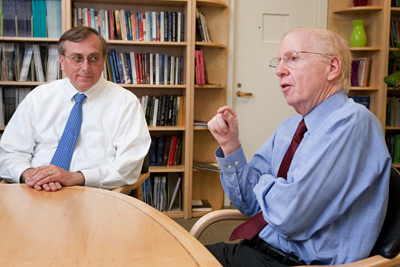Provost taps eight key faculty to draft strategic plan
By Susan Kelley

Eight Cornell faculty members will advise the university's president and provost on the roadmap for Cornell's future. The Strategic Plan Advisory Council will synthesize recommendations gathered from the entire campus community. A public draft of the full strategic plan, written by the council, will be released in March, Provost Kent Fuchs announced Oct. 15.
"They're some of Cornell's most distinguished faculty, and they have a reputation among their colleagues of being strategic in both their thinking and actions," Fuchs said of the council members. "I've asked them to create a clear vision and plan for Cornell's future."
The council members are: Lance Collins, professor of mechanical and aerospace engineering; Jonathan Culler, Class of '16 Professor of English; Sandra Greene, professor of history; Katherine Hajjar, professor of cell and developmental biology (Weill Cornell Medical College); Martha Haynes, Goldwin Smith Professor of Astronomy; Susan McCouch, professor of plant breeding and genetics; and Michael Waldman, Charles H. Dyson Professor of Economics. Ed Lawler, Martin P. Catherwood Professor of ILR, will chair the council.
The university's comprehensive planning effort, led by Fuchs, began in earnest in June. The overall planning initiative was announced as Reimagining Cornell, and is intended to reduce what was expected to be a $215 million annual budget deficit by 2015, as well as create a stronger, more focused university. Since then, the university has contracted a global consulting firm to advise on how to streamline support operations. "The firm has recommended changes that are expected to save at least $90 million annually in administrative costs by 2014," Fuchs said. "Their work will protect our ability to enhance Cornell's academic mission."
The administration also created 20 academic and cross-college task forces to offer recommendations on how to reduce costs and enhance the university's academic excellence. The task forces submitted recommendations Oct. 1, which Skorton and Fuchs are now reviewing. The Cornell community will be asked for input on the significant recommendations from the task force reports in November. The president and provost will provide decisions on the academic task force recommendations as input to the council for inclusion in the strategic plan. Skorton and Fuchs have also held a series of public forums for staff, faculty and students and have been encouraging the campus community to share comments and questions on the comprehensive planning initiative.
Lawler pointed out that the council will only advise Skorton and Fuchs, who will make final decisions about the strategic plan. "The council's role will depend on what the provost and president need," Lawler said. "If they need more feedback, we'll provide it." Only faculty members make up the council because the primary focus of the plan is on academic excellence, Fuchs said.
The council will oversee four working groups on: education; research, scholarship and creativity; public engagement; and organizational stewardship. Fuchs has begun sending out invitations to select students, staff, faculty and administrators to join the working groups. In addition to input from the working groups and the Cornell community, the council will have access to information from the 20 academic task forces, strategic plans from colleges and schools, annual reports and previous planning initiatives.
Before the council releases a complete draft of the strategic plan in March, it will seek feedback from the campus community on the plan's key concepts. To do so, Fuchs, Lawler and council members will hold town meetings in January and February. "What we want is to get great ideas for the plan and also thoughtful criticisms," Fuchs said.
The council will present a revised draft to the Cornell Board of Trustees in March, followed by another period of public commentary will follow in April. A final plan will be issued in May.
In the meantime, members of the campus community are invited to offer input via the strategic plan Web site, http://www.cornell.edu/reimagining/.
Media Contact
Get Cornell news delivered right to your inbox.
Subscribe